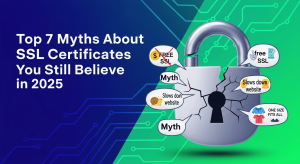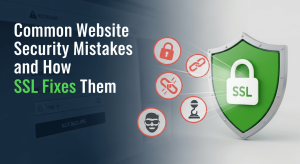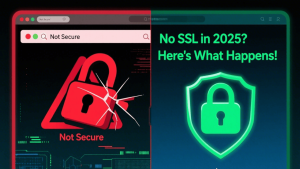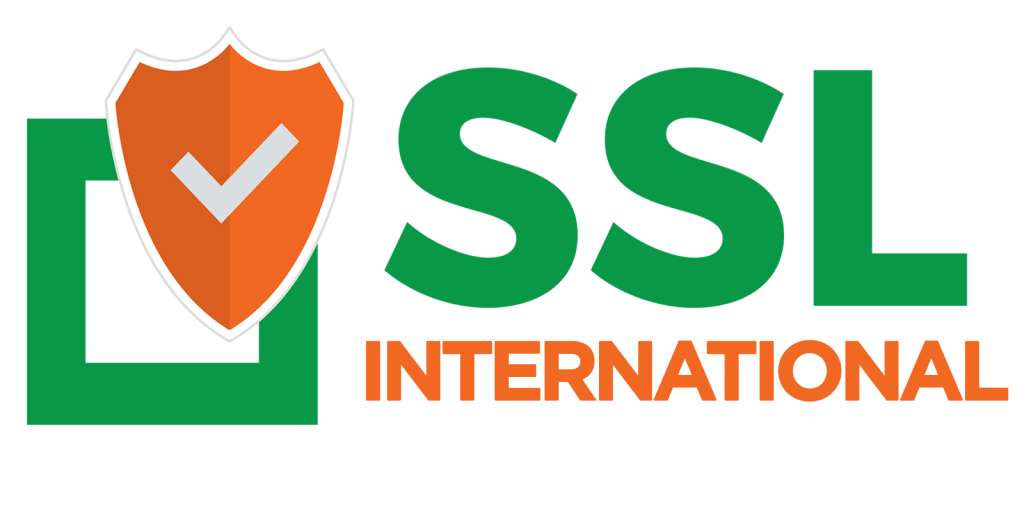SSL myths continues to confuse many in the digital world. As we navigate the ever-evolving landscape of online security, one component remains critical for protecting sensitive information: SSL certificates. Despite their widespread adoption, several misconceptions continue to persist about their purpose and effectiveness. As we enter 2025, it's essential to debunk these myths to ensure that website owners and users alike understand the vital role SSL certificates play in safeguarding data and enhancing trust. In this article, we will explore the top seven myths about SSL certificates that many still believe, offering clarity and insights that can help strengthen your online security strategy.
Understanding SSL Certificates: The Basics
Definition and Purpose of SSL Certificates
SSL (Secure Sockets Layer) certificates are small data files on a web server that establish a secure connection between a web server and a browser. Picture it as a digital handshake that ensures data transferred between users and the website is encrypted, meaning snoopers have a much harder time eavesdropping on your online shenanigans. In essence, SSL certificates not only protect sensitive information but also boost user trust and enhance the website's credibility.
How SSL Works: The Encryption Process
The magic of SSL happens through a series of steps. When you visit a website secured with SSL, your browser initiates a handshake with the server, which involves exchanging cryptographic keys. Once this handshake is complete, all the data transmitted gets encrypted—think of it as putting your information in a safe, which only the intended recipient has the key to. And just like that, you've set up a secure channel, preventing any unwanted viewers from peeping at your private conversations or transactions.
SSL Myths 1: SSL Certificates Are Only for E-commerce Sites
While e-commerce sites often steal the spotlight when it comes to SSL certificates, this myth is as outdated as dial-up internet. SSL certificates are crucial for all types of websites, regardless of whether they're selling products or offering blog posts about cats. With increasing concerns over privacy and data protection, even a simple portfolio site needs an SSL certificate to show visitors that their information is safe. In short, if you have a website, you should secure it, period.
SSL Myths 2: Free SSL Certificates Are Just as Secure as Paid Ones
Ah, the allure of free stuff, who doesn’t love it? However, when it comes to SSL certificates, "free" can come with some strings attached. While free SSL providers, like Let's Encrypt, offer decent encryption, they often lack customer support and advanced features that you might need down the road. Paid SSL certificates, on the other hand, provide added layers of validation and assurance, ensuring that your website is backed by a trusted certificate authority. In the wild west of the web, sometimes you get what you pay for!
Free SSL certificates can come with a host of limitations. Often, they provide only domain validation, which means they confirm that you own the domain but don’t verify your identity. In the world of online security, this can be especially risky. Plus, free certificates can have shorter validity periods, requiring frequent renewals and keeping you on your toes. So consider your website's needs: is a "one size fits all" option really worth the risk?
SSL Myths 3: SSL Certificates Are Only Necessary for Websites Collecting Personal Information
This myth is like thinking you only need an umbrella during a rainstorm, it’s simply not true! SSL certificates are valuable for every website, even if you're not collecting personal information. They help build a secure environment, boost your SEO rankings, and demonstrate to users that you take their security seriously. Whether you're sharing funny cat videos or industry insights, SSL can enhance credibility and trustworthiness, making it a must-have for all site owners.
Neglecting to use SSL opens the door to a myriad of risks. Without it, any data transmitted can be intercepted by malicious actors! Even seemingly harmless sites can be targeted by hackers looking to turn your website into a launching pad for phishing attacks. Moreover, browsers like Chrome and Firefox are on a crusade, marking non-SSL sites with ugly warnings that scream, "Danger, Will Robinson!" So, keeping your website unsecured is not just a bad idea, it’s a recipe for disaster!
SSL Myths 4: Once Installed, SSL Certificates Don't Need Maintenance
Just like that gym membership you forgot about, SSL certificates come with an expiration date. Typically valid for a year or two, these shiny little security badges need to be renewed periodically. Failing to do so can lead to your site throwing temper tantrums like a toddler denied candy, users will see warnings instead of your beautiful homepage. Set reminders, mark your calendars, or write it on a post-it note; just don’t let your certificate expire!
Installing an SSL certificate is just the beginning of your security journey. Regular security audits are like routine check-ups for your site. They help you spot vulnerabilities before they turn into a full-blown crisis. Make it a habit to assess your SSL configurations and look for any potential issues. It’s much better to proactively fix problems than to deal with the aftermath of a security breach, trust me.
SSL Myths 5: SSL Certificates Slow Down Website Performance
Gone are the days when SSL certificates were the website equivalent of a lead weight. Modern SSL technology, particularly with the rise of HTTPS/2, actually enhances website speed. Through nifty tricks like multiplexing, SSL can deliver content faster than ever. So, instead of an old tortoise dragging your site down, think of SSL as a turbocharger, making your website zoom past competitors.
Numerous studies have shown that the performance difference between SSL and non-SSL websites is negligible, if not in favor of SSL! Websites using SSL often benefit from higher search engine rankings, which, spoiler alert, can also boost traffic. So, if you hear someone whispering that SSL slows down websites, just nod and smile while secretly knowing they’re behind the times.
SSL Myths 6: All SSL Certificates Offer the Same Level of Security
Not all SSL certificates are created equal; they're like ice cream flavors, each with its own unique features. There are three main types: Domain Validation (DV), Organization Validation (OV), and Extended Validation (EV). DV is the basic scoop, OV adds a sprinkle of verification, and EV is the double fudge brownie sundae of SSLs, showing that you mean business. Choose wisely to match your website’s needs; after all, you wouldn’t use a kiddie cone for a wedding cake.
When it comes to selecting the right SSL certificate, consider your website’s purpose and traffic. For a simple blog, a DV might do the trick. But for e-commerce sites that handle sensitive information, investing in an EV certificate can build trust with your customers. Remember, a well-chosen SSL is like a strong lock on your door, it keeps the bad guys out and your visitors happy.
SSL Myths 7: HTTPS Guarantees Complete Website Security
While SSL certificates are critical for securing data in transit, they don’t magically transform your site into an impenetrable fortress. They protect your data from prying eyes during transmission, but that doesn’t mean your website is free from vulnerabilities like malware, outdated software, or poorly designed applications. Think of SSL as a strong fence around your garden; it keeps out some intruders, but a determined raccoon (or hacker) might still find a way in.
To truly safeguard your website, layering security is key, like building an impenetrable lasagna! Along with SSL, consider implementing firewalls, regular updates, malware scanners, and even good ol’ user education on strong passwords. A holistic approach to security will keep your website safe from a variety of threats, ensuring your digital garden flourishes for all to enjoy.In conclusion, understanding the truths about SSL certificates is crucial for anyone looking to enhance their website's security and maintain user trust. By dispelling these common myths, you can make informed decisions that protect both your data and your visitors. As the digital landscape continues to evolve, staying educated about the tools that safeguard your online presence remains a top priority. Embrace SSL certificates not just as a necessity, but as a foundational element of your website's security strategy.
Conclusion
As myths about SSL Certificates continue to mislead businesses in 2025, one thing remains clear: choosing the right provider makes all the difference. At SSL International, we combine unmatched resources, expert staff, advanced technology, and unwavering dedication to deliver the best SSL solutions worldwide. From premium SSL Certificates to seamless renewals, we make it easier for you to secure your digital presence with confidence.
Trust SSL International as your reliable partner in online security,
contact us today to explore how we can protect your business. 





